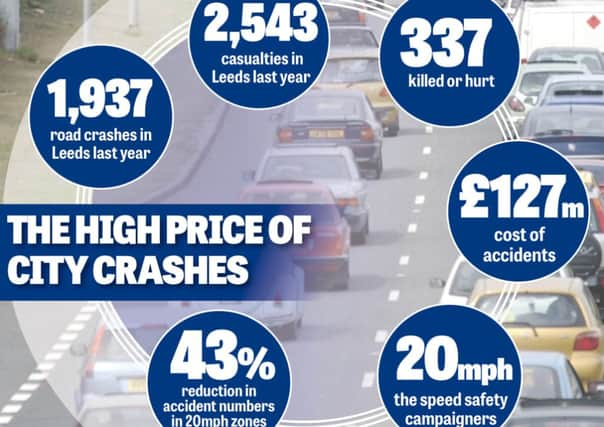Plea to enforce 20mph zones on city’s roads


A new council report has shown that the “prevention value” of all injuries suffered in road crashes in Leeds last year was a £127m. The total cost of the accidents - taking into account policing, emergency service attendance, hospital treatment, insurance and property damage - was estimated at £139m.
In 2014, there were 1,937 road traffic collisions in Leeds, with a total of 2,543 casualties. Of those injured, 337 people were killed or seriously hurt. Pedestrians made up 404 of the injured, and 253 were children.
Advertisement
Hide AdAdvertisement
Hide AdResearchers acknowledge that “there is no absolute value that can be put on human pain and suffering”. However, the revelations have led to campaigners calling for an urgent fast-tracking of the city’s 20mph zones rollout.
Leeds City Council is currently implementing the lower speed zones in communities around schools, and it says this has already led to a “promising downward trend” in accidents.
The authority has already stated it wants to create 20mph speed limits in the majority of residential streets across Leeds by 2020 in a programme set to cost a total of £6m.
The council has also pledged to slash serious injuries and deaths on the city’s roads by half by 2026.
Advertisement
Hide AdAdvertisement
Hide AdBut campaigners want a quicker, wider rollout of 20pmh zones to all residential and built up areas - and the creation of a forward thinking highways strategy which prioritises walking and cycling over car usage.
Gary Rae, the campaigns manager for the road safety charity, Brake, said: “These figures highlight both the human and economic costs of road crashes.
“By starting to introduce 20mph limits Leeds council is taking one simple step to reduce collisions and casualties, enabling residents to live active lifestyles, and reduce pollution. 20mph limits are a proven, cost-effective way of making our streets safer, which is why it’s time for the government to adopt 20mph as the default national urban limit.”
A report presented to an internal council watchdog, which is investigating the impact of 20mph zones, said the lower limits have been shown to deliver “tangible road safety benefits” in Leeds.
Advertisement
Hide AdAdvertisement
Hide AdIt revealed the number of accidents in Leeds areas covered by 20mph zones fell by 50 a year.
However, it also warned that the “more blanket wide area based approach” - as favoured by campaigners - risked not being as effective and could lead to areas that need other road safety and pedestrian-friendly features being “overlooked”.
A Leeds City Council spokeswoman said: “By looking at individual sites and tailoring 20 mile an hour zones for each one based on need and circumstances, we can achieve better outcomes for those communities than a blanket roll out would achieve.
“With a mix of rural and urban areas, a ‘one size fits all’ solution won’t work for Leeds and when and how 20 mile an hour zones are implemented in other cities may not be appropriate here.
“Although a monetary amount can be attributed to the cost of an accident, the true cost of lives saved by improving road safety with 20 mile an hour zones is immeasurable.”